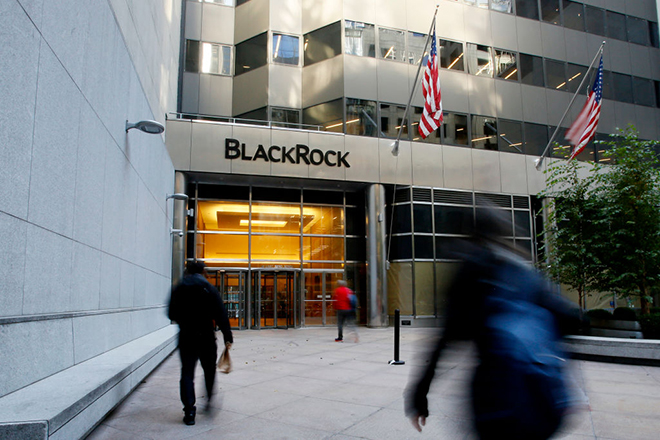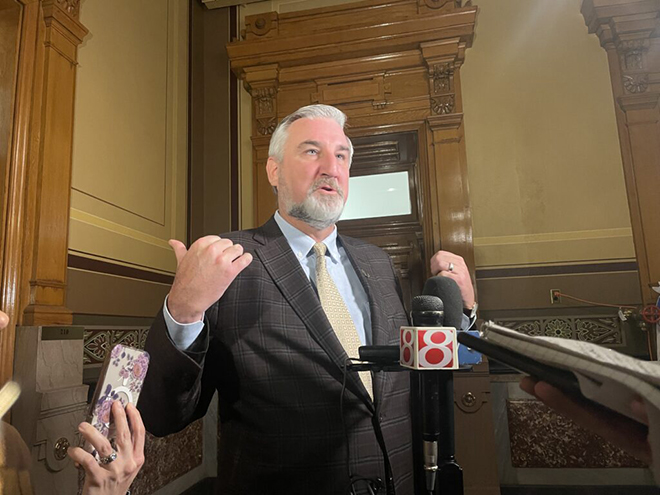S&P Global Offerings
Featured Topics
Featured Products
Events
S&P Global Offerings
Featured Topics
Featured Products
Events
S&P Global Offerings
Featured Topics
Featured Products
Events
Banking & Capital Markets
Economy & Finance
Energy Transition & Sustainability
Technology & Innovation
Podcasts & Newsletters
Banking & Capital Markets
Economy & Finance
Energy Transition & Sustainability
Technology & Innovation
Podcasts & Newsletters
S&P Global Offerings
Featured Topics
Featured Products
Events
22 Feb, 2023
By Karin Rives

| BlackRock workers outside the firm's headquarters in New York. The asset manager has been a target for an anti-ESG campaign. Source: Corbis News/Getty Images News via Getty Images |
Nascent backlash against a multistate campaign to part with investment funds that have environmental, social and governance strategies have cropped up in some unexpected places.
On Feb. 1, the North Dakota House of Representatives — where Republicans hold a supermajority — voted down legislation that directed the state treasurer to boycott investment firms over their ESG policies. The vote was 90-3.
"This bill, while well-intended, had too many unintended consequences that would have hurt our own Bank of North Dakota and other main street banks that do support our state's [agriculture] and energy businesses," Rep. Mitch Ostlie, a sponsor of the bill, told lawmakers before asking them to reject the legislation.
One week later, the board of trustees overseeing Kentucky's $7.9 billion County Employees Retirement System bucked a recent decree by State Treasurer Allison Ball to divest from BlackRock Inc. and other investment firms over their fossil fuels policies.
"We're simply informing the Treasury secretary that we believe that to comply here would be inconsistent with our fiduciary duty and responsibility," Ed Owens III, the public pension system's CEO, told other trustees Feb. 8 before the unanimous vote. The Kentucky Treasurer's office did not respond to requests for comment on the trustees' letter.
A legislative bill in Indiana hit a roadblock the same week. The legislation sought to prohibit Indiana's $42.4 billion public pension fund from relying on firms that consider ESG criteria in investments, but a new fiscal analysis prepared for the state legislature concluded that the bill would cost the pension system more than $6.7 billion in lost returns over 10 years.
"It kind of sent a shockwave through the state House," Kevin Brinegar, president and CEO of the Indiana Chamber of Commerce, a group opposed to the bill, said in an interview. "If the funds earn less money, the state has to put more tax dollars into the system to make up the difference. This is an apple cart that we don't see [as] needing to be upset."

Internal resistance against the anti-ESG backlash in Republican-led states will continue to grow, predicted Josh Lichtenstein, a Ropes & Gray law partner who advises asset managers, pension plans and banks on private retirement and ESG-related issues.
"There's been this tension the entire time, where you have a backlash from the people who are actually responsible for these investments," Lichtenstein said in an interview. "Retirement boards, in their view, have been properly discharging a fiduciary duty in selecting their [fund] manager, and now they're told that relationship is not appropriate anymore. It doesn't go over so well."
Even so, State Rep. Ethan Manning, the Republican sponsor of Indiana's ESG boycott legislation, H.B. 1008, is hopeful his bill will become law.
"We have plenty of time to have discussions and make sure we are protecting Indiana's pensions from being influenced by political agendas and keeping the focus on financial returns," Manning said in a statement.
On Feb. 21, Manning introduced an amendment exempting private market funds from the legislation, which he said would substantially lower its cost. With that, the bill moves forward to the House floor despite some lawmakers' questions about the new analysis.
Indiana pension fund outperformed
Jonathan Williams, chief economist with the American Legislative Exchange Council questioned the data behind the Indiana fiscal note. A self-described "limited government, free markets" group, the American Legislative Exchange Council developed the model policy on which many Republican-led states have based new anti-ESG bills.
"I would like to see them publish all of their assumptions and methodology, but their numbers seem highly suspect," Williams wrote in an email. Williams noted that he has not heard from any other state with similar concerns.
The $6.7 billion impact figure in the fiscal note came from the Indiana Public Retirement System, or INPRS.
"INPRS considered the opportunity cost of moving all investments to passive public markets within its Defined Benefit and Defined Contribution plans, which was estimated to be $6.7 billion over 10 years," Dimitri Kyser, a spokesperson for the system, wrote in an email. "This estimated value is based on the assumption that INPRS's retirement funds continue to outperform their benchmarks from private markets and active management over the next 10 years ... at the same level that has been realized the past 10 years as compared to INPRS' 6.25% target annual rate of return."
In addition, changes in proxy voting policies would increase administrative costs by $550,000 annually, Kyser said. Under the proposed law, the pension fund would no longer be able to delegate shareholder votes to a fund manager.
The upheaval around the ESG bill has the attention of Indiana Gov. Eric Holcomb, a Republican, who told local reporters, "Intent, and where that potentially collides with reality, is always of concern to me."

| Indiana Gov. Eric Holcomb talks to reporters Feb. 7 about a proposed ESG boycott bill. Source: Leslie Bonilla Muñiz, Indiana Capital Chronicle |
Questions around costs
Texas enacted two anti-ESG laws in September 2021. Business researchers with the University of Pennsylvania's Wharton School estimated in July 2022 that municipalities and other public entities in Texas would pay between $303 million and $532 million more in interest on the $32 billion they borrowed during the first eight months after those laws went into effect.
A subsequent study commissioned by investor advocacy groups As You Sow and Ceres said six other states could face up to $708 million in higher borrowing costs if they, like Texas, extended their ESG boycotts to municipalities.
One of those states, Missouri, already raised some eyebrows after pulling $500 million in assets from BlackRock in October 2022. The state treasurer cited BlackRock's "woke political agenda."
During the fiscal year ending June 30, 2022, NISA Investment Advisors LLC charged the Missouri employee retirement system $5.4 million in fees compared with BlackRock's $1.2 million in fees, according to the pension system's annual report. NISA's portfolio at the time was valued at $922 million and BlackRock's at $667 million.
Even so, the state shifted nearly all management of its pension management to NISA following the termination of BlackRock. Candy Smith, a Missouri State Employees' Retirement System spokesperson, said the fees were factored into the decision to end the relationship with BlackRock, as were "investment risk, return and any expected portfolio impact."
S&P Global Commodity Insights produces content for distribution on S&P Capital IQ Pro.
